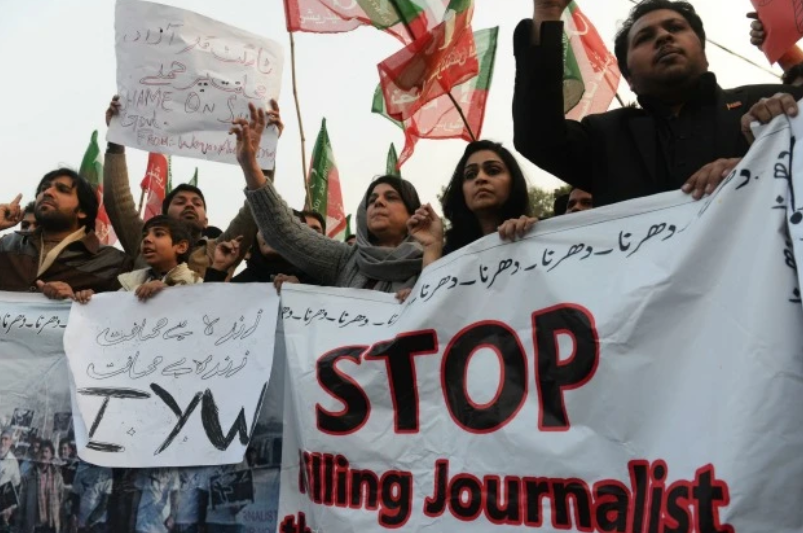KP’s Militancy Challenges Journalists
Dr Samira Gul
Peshawar: The recent surge in militancy in Khyber-Pakhtunkhwa has posed significant challenges for journalists, necessitating increased responsibilities, concerns about safety, and the need for accurate reporting. In this evolving security situation, senior journalists, press club representatives, and law enforcement officials emphasize the vital role of journalists in covering these developments.
According to the Pakistan Press Foundation (PPF), a total of 72 instances of physical attacks on journalists and media professionals were documented in 2022-23. These included two journalist killings, 62 instances of manhandling or injuries, three instances of kidnappings or abductions, three instances of raids, and two detentions.
 A total of 72 instances of physical attacks on journalists and media professionals were documented in 2022-23: PPF
A total of 72 instances of physical attacks on journalists and media professionals were documented in 2022-23: PPF
Furthermore, journalists faced threats in at least 20 instances, while online trolling, harassment, and abuse continued. Journalists and media professionals were also arrested in 16 instances, and legal notices or inquiries were initiated against journalists in 12 instances. These figures highlight the grave dangers journalists face in the line of duty.
Shamim Shahid, a senior journalist in Khyber-Pakhtunkhwa, expressed deep concern about the escalating militancy and recognized the pivotal role journalists play in disseminating information, particularly during times of crisis.
We must ensure our safety while continuing to deliver accurate and unbiased news to the people: Shamim Shahid
However, he acknowledged that this new wave of militancy presents unprecedented challenges for the profession, stating, “We must ensure our safety while continuing to deliver accurate and unbiased news to the people.”
The increasing difficulty in reporting on militancy stems from various factors, including self-censorship. Journalists face the risk of reprisals and threats from militant groups, leading many to withhold sensitive information or refrain from reporting certain incidents to protect their safety. This self-censorship poses a challenge to the accuracy and comprehensiveness of news coverage.
Irfan Musazai, general secretary of Peshawar Press Club, stressed the urgent need for enhanced security measures to safeguard journalists. He emphasized the necessity of collaboration between press clubs, media organizations, and authorities to provide comprehensive training, support, and robust security arrangements for journalists operating in Khyber-Pakhtunkhwa.
 The dissemination of accurate information is crucial for maintaining public trust and countering the spread of misinformation: Senior journalist Syed Bukhar Shah
The dissemination of accurate information is crucial for maintaining public trust and countering the spread of misinformation: Senior journalist Syed Bukhar Shah
Syed Bukhar Shah, a senior journalist and former president of the KP Union of Journalists, underscored the paramount importance of accurate reporting during these challenging times. Shah emphasized that journalists must exercise caution and adhere to journalistic ethics while covering incidents related to militancy.
“The dissemination of accurate information is crucial for maintaining public trust and countering the spread of misinformation,” said Bukhar Shah.
Shahida Perveen, a senior reporter at Daily Express, emphasized the significance of responsible journalism in such challenging times. She asserted that journalists have a duty to report facts accurately and responsibly, upholding the principles of journalism while ensuring their own safety.Perveen also highlighted the need for support from media organizations and the government to enable journalists to carry out their work effectively.
Journalists often face the dilemma of balancing the urgency to disseminate information with the need for thorough research and accurate reporting. This pressure can inadvertently lead to the spread of misinformation and rumors, further complicating the security situation: Journalist Asad Khan
Asad Khan, a senior journalist and former member of the Khyber Union of Journalists, shared that the pressure to report quickly and be the first to break news can compromise fact-checking and verification.
“Journalists often face the dilemma of balancing the urgency to disseminate information with the need for thorough research and accurate reporting. This pressure can inadvertently lead to the spread of misinformation and rumors, further complicating the security situation,” he added.
Furthermore, the evolving tactics and sophistication of militant groups present challenges in accessing accurate and reliable information. Militants employ strategies to control the narrative and manipulate public perception. Journalists must navigate through a complex web of sources and corroborate information to effectively counter these efforts.
The increasing difficulty faced by journalists in Khyber-Pakhtunkhwa is primarily due to the rising threats to their safety and the need for accurate reporting: A senior police officer
A senior police officer in the KP police department, requesting not to be named as he was not authorised to speak to the media, acknowledged the contribution of journalists in combating militancy. The officer recognized journalists as a bridge between law enforcement agencies and the public, stating that they play a crucial role in raising awareness, generating leads, and supporting security forces.
The officer emphasized the safety of journalists as it is paramount. The rise in militant activities puts reporters, photojournalists, and correspondents at risk of becoming targets themselves. The officer reassured journalists of the commitment to ensuring their safety and providing necessary assistance.
The increasing difficulty faced by journalists in Khyber-Pakhtunkhwa is primarily due to the rising threats to their safety and the need for accurate reporting. Journalists shoulder the responsibility of upholding journalistic standards and delivering truthful news amidst the surge in militancy.
Through collaboration among press clubs, law enforcement agencies, and journalists themselves, there is hope that the media can continue to play its vital role in providing accurate information, countering misinformation, and raising awareness about the security situation in the region.
 The risks journalists face in the region, highlighted the need for balanced reporting and reporting the actual situation: KU Dr Rehman Ullah
The risks journalists face in the region, highlighted the need for balanced reporting and reporting the actual situation: KU Dr Rehman Ullah
Dr Rehman Ullah, chairman of the Journalism Department at Kohat University, emphasized the importance of studying different conflicts in Khyber-Pakhtunkhwa and tribal belts before reporting on them.
He stated that reporters should not take sides in conflicts and should report the actual cases of conflict, considering the location and modes of these conflicts. He mentioned the risks journalists face in the region, highlighted the need for balanced reporting and reporting the actual situation.
Dr Rehman Ullah elaborated his concern by giving the argument that covering militancy requires journalists to navigate through a hazard of ethical dilemmas and safety concerns. In the current scenario, journalists find themselves at the forefront, tasked with the challenging responsibility of reporting on these incidents while balancing the need for public awareness and maintaining national security.
They must have to fulfill these national responsibilities keeping in view the ethical and moral values of the region as well as their own safety and security measures. Cooperation and collaboration between journalists and government authorities can lead to more informed reporting and an enhanced understanding of security challenges.
By recognizing the media as partners in peace-building efforts, authorities can work hand in hand with journalists to counter the new wave of militancy effectively.
In the face of adversity, journalists must remain vigilant, courageous, and committed to their role as the fourth pillar of the state, ensuring that correct information triumphs over fear and misinformation: Journalist Faheem Khan
Muhammad Faheem Khan, a senior journalist at Mashriq TV, emphasized two crucial points for journalists working in the region: balanced reporting and not taking sides in conflicts. He suggested that reporters should seek comments from both parties involved in a news story and present it without bias.
“In the face of adversity, the journalists must remain vigilant, courageous, and committed to their role as the fourth pillar of the state, ensuring that correct information triumphs over fear and misinformation. Through responsible journalism, these dedicated professionals can contribute to a brighter and more secure future for Khyber-Pakhtunkhwa.”
“Responsibility also lies with media organizations to create an enabling environment for responsible journalism. Media organizations should encourage their journalists to undergo specialized training in conflict reporting, mental health support, and digital security. Furthermore, newsroom policies should prioritize the safety and well-being of journalists, offering adequate rest periods and emotional support to counter the psychological toll of covering conflict-sensitive areas. ” Faheem further added.

Comments are closed.